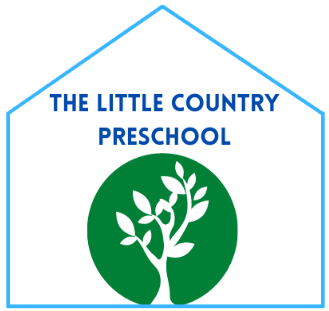Teaching Kindness: Simple Ways to Help Your Child Develop Empathy
February 5, 2025
Raising Kind and Empathetic Kids: Simple Ways to Nurture Compassion in Your Preschooler
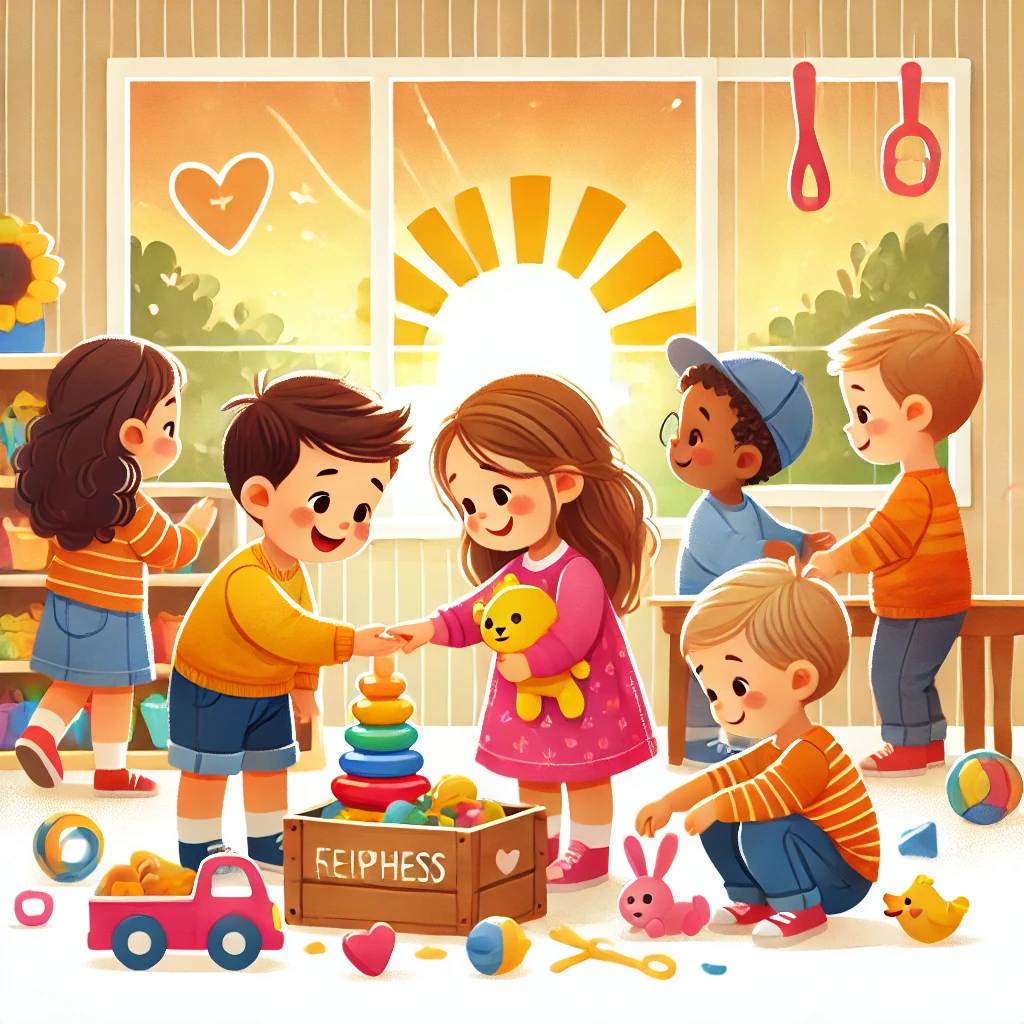
As parents, we all want our children to grow into kind, compassionate individuals who understand the importance of empathy. In today’s fast-paced world, teaching kindness is more important than ever. But how can we, as parents, help our little ones develop empathy, emotional intelligence, and a caring attitude toward others?
At The Little Country Preschool, we believe that kindness is a learned skill, just like reading or counting. By incorporating small, intentional actions into daily life, you can help your child build a strong foundation of empathy that will guide them for years to come.
Why Teaching Kindness Matters
Research shows that children who learn empathy and emotional awareness from a young age develop better social skills, build stronger friendships, and handle conflicts more effectively. Encouraging kindness not only benefits your child but also creates a positive, nurturing community for everyone around them.
Simple Ways to Teach Kindness at Home
1. Lead by Example
Children learn by watching the people around them—especially their parents! When they see you treating others with kindness, patience, and respect, they are more likely to model that behavior. Try simple acts of kindness, like holding the door open for someone, offering a smile, or speaking kindly about others.
2. Talk About Feelings
Help your child recognize and name emotions—both their own and those of others. When they understand how people feel, they naturally develop empathy. You can ask questions like:
🔹 “How do you think your friend felt when you shared your toy?”
🔹 “What can we do to help someone who is feeling sad?”
3. Encourage Sharing & Taking Turns
Preschool-aged children are still learning the concept of sharing and fairness. Reinforce the idea that taking turns helps everyone feel included. Practice sharing at home with toys, snacks, or activities, and praise their efforts when they show generosity.
4. Read Books About Kindness
Reading is a powerful way to teach empathy! Choose books with stories about kindness, inclusion, and helping others. Some great options include:
📖 “Have You Filled a Bucket Today?” by Carol McCloud
📖 “The Kindness Book” by Todd Parr
📖 “Last Stop on Market Street” by Matt de la Peña
Discuss the characters’ feelings and how your child would react in a similar situation.
5. Practice Gratitude Together
Teaching children to appreciate what they have helps them develop a kind and grateful heart. Start a family tradition of saying one thing you’re grateful for each day, whether it’s a kind friend, a fun activity, or a delicious meal.
6. Encourage Acts of Kindness
Make kindness part of daily life by encouraging simple acts like:
💛 Helping a friend clean up after playtime
💛 Making a homemade card for a family member
💛 Saying “thank you” and “please”
💛 Complimenting a friend or sibling
Kindness Starts Here!
At The Little Country Preschool, we believe that kindness is the key to a happy, thriving community. Through play-based learning, social-emotional activities, and positive reinforcement, we help children develop the skills they need to become compassionate and caring individuals.
Would you like to learn more about how we foster kindness, empathy, and social growth in our students? Contact us today to schedule a tour!
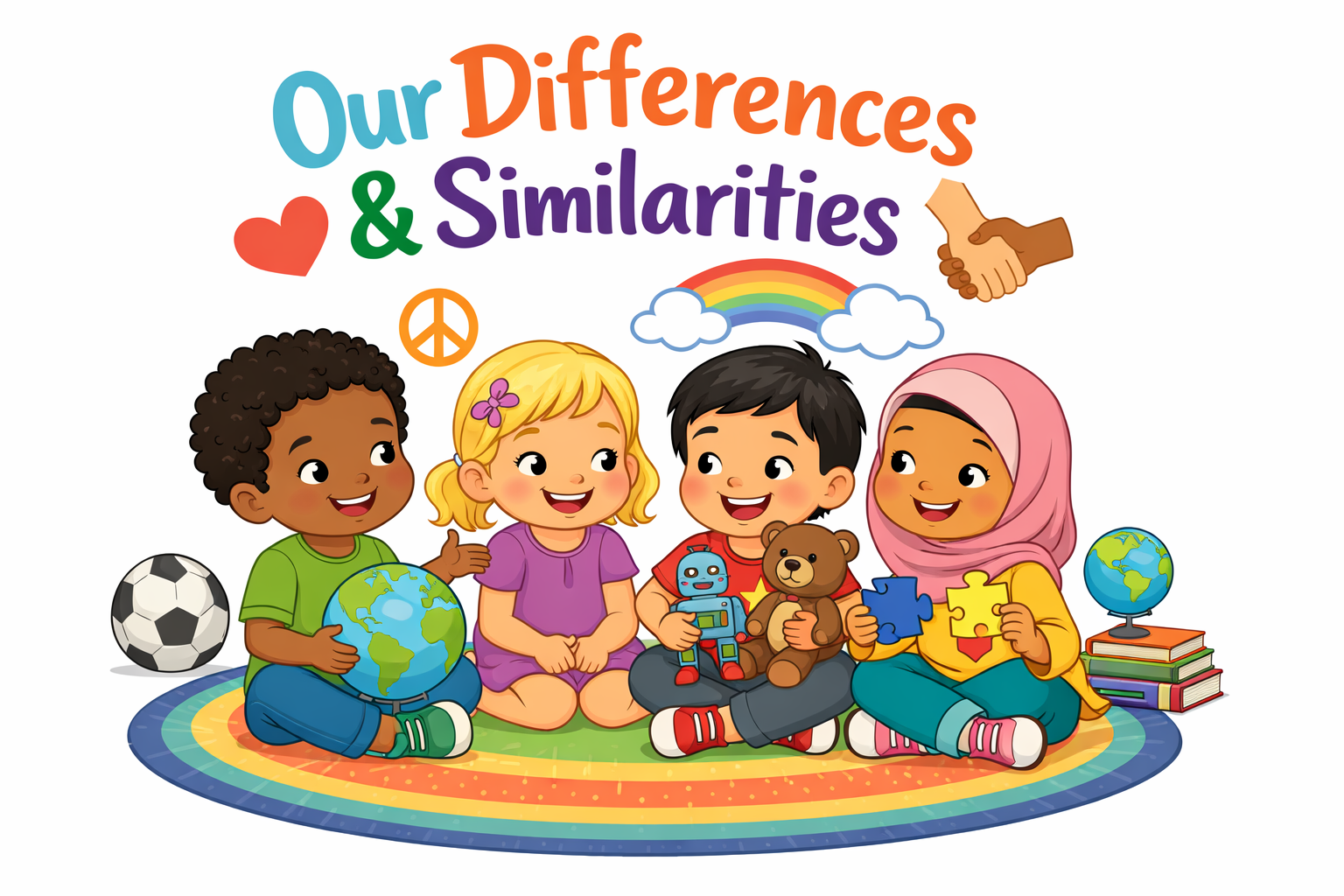
When you walk into a preschool classroom, you see it instantly, every child is unique. Some are quiet observers, some are big storytellers, some want to lead, and others prefer to follow. Some children love hugs, some need space. Some talk early, some take their time. And yet, at the same time, they are all so beautifully similar. Every preschooler wants to belong. Every child wants to feel safe. Every child wants to be seen, understood, and loved. This week’s theme, Our Differences and Similarities, is a powerful opportunity to help children build kindness, empathy, and confidence early in life. The lessons they learn now can shape how they treat others, how they handle friendship struggles, and how they feel about themselves as they grow. Below are meaningful ways preschools can support this theme, and simple ways families can continue it at home. Teaching Preschoolers That being Different Is Something to Celebrate Preschool aged children are naturally curious. They notice differences quickly, such as hair color, skin tone, the way someone talks, what foods they eat, and what games they like to play. They are not trying to be unkind; they are learning how the world works. This is why early childhood is the perfect time to teach that differences are not “weird” or “wrong.” Differences are simply part of being human. When educators and parents gently guide these moments, children learn that noticing differences is okay, and that kindness is always the right response. Strong message for preschoolers: We are not all the same, and that is a good thing. How Preschoolers Learn Similarities Through Everyday Moments Children do not learn empathy through lectures. They learn it through experiences. They learn through routines, friendships, and daily life in the classroom. Even children who seem very different from each other often share the same needs • They want a friend to play with • They want comfort when they are sad • They want to feel proud when they succeed • They want help when something is hard When teachers emphasize these shared feelings, children begin to see what connects them, not just what makes them different. This builds emotional intelligence, and emotional intelligence is one of the greatest predictors of future success, both socially and academically. Kindness and Friendship Skills That Grow From This Theme One of the most valuable outcomes of this week’s theme is helping children build real friendship skills. Preschoolers are learning how to: • Take turns • Listen to others • Join play without interrupting • Respect personal space • Repair friendships after conflict This theme supports those lessons because it teaches children that not everyone plays the same way, and that does not mean someone is being “mean.” It may simply mean they are different. When a child learns, “My friend likes to play quieter games than I do,” they are learning flexibility. When a child learns, “My friend speaks differently than I do,” they are learning patience. When a child learns, “My friend has a different family than I do,” they are learning respect. These are life skills, not just preschool skills. Activities That Help Preschoolers Understand Differences and Similarities Here are classroom friendly activities that work beautifully for this theme and can easily be continued at home. 1. “Same and Different” Sorting Games Children can sort pictures by categories such as: • Animals that fly, animals that swim • Foods that are sweet, foods that are salty • Things we wear in winter, things we wear in summer This teaches children that differences are normal, and categories help us understand the world without judging it. 2. Read Books That Celebrate Diversity and Inclusion Books are a gentle way to introduce big ideas. Stories help children connect emotionally, not just intellectually. Teachers and parents can ask simple questions like: • “How is this character like you?” • “How is this character different from you? • “What would you say to them if they were your friend?” 3. Emotion Matching Children look at faces showing emotions such as happy, sad, frustrated, excited, nervous, and calm. They learn that even if someone looks different, we all feel the same emotions. This teaches empathy in a way preschoolers can truly understand. What Parents Can Say at Home to Support This Lesson Sometimes parents worry about saying the “wrong thing.” The truth is, preschoolers do not need perfect words, they need calm guidance and clear kindness. Here are a few phrases that work well: • “Everyone is different, and everyone belongs.” • “It is okay to notice differences; we always speak kindly.” • “Some friends play differently, let’s find a way to include them.” • “It is okay if you and your friend like different things.” These phrases teach children that differences do not create separation. They create variety, creativity, and new ways to learn. Why This Week’s Theme Matters More Than Ever In today’s world, children are absorbing far more than we realize. They are watching how adults talk, how people treat each other, and how differences are handled. When we teach children early that differences are normal and kindness is expected, we are shaping the future. We are raising children who will grow into adults who: • Respect others • Advocate for fairness • Build healthy friendships • Have strong self confidence • Feel comfortable being themselves And that is one of the greatest gifts early childhood education can provide. Help Your Child Grow Into a Confident, Kind, and Inclusive Friend If you are looking for a preschool environment where your child will feel seen, supported, and celebrated, we would love to meet you. Our classrooms are built around social emotional learning, kindness, and joyful growth, because every child deserves a place where they belong. Schedule a Tour Today and See How We Teach Kindness Through Real Connection Contact us today to schedule a tour, ask questions, and learn more about our program. We cannot wait to welcome your family and help your child build friendships that last.
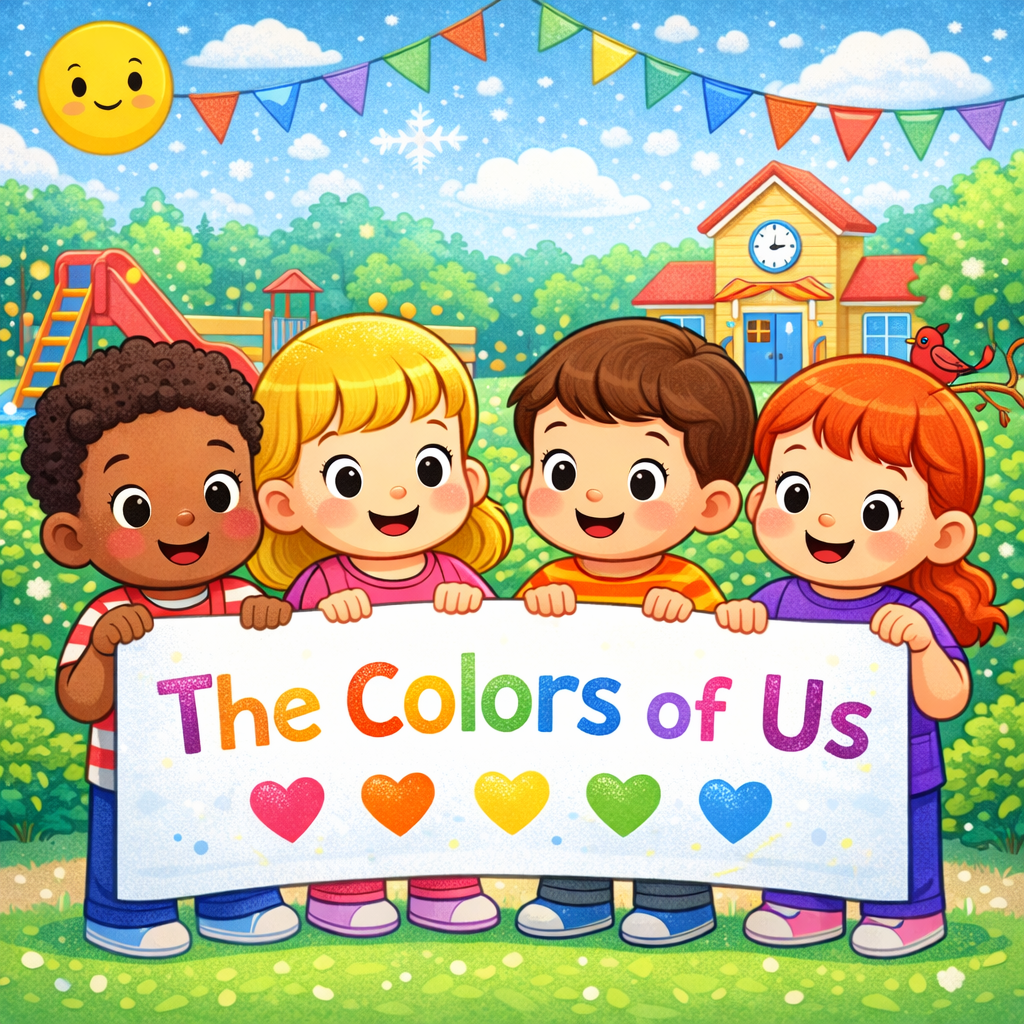
Preschool is a beautiful time in a child’s life, full of curiosity, imagination, and new friendships. It is also one of the most important stages for learning how to treat others with kindness and respect. Young children naturally notice differences in people, whether it is skin tone, hair, languages, traditions, or family routines. With gentle guidance, those observations can become something positive, a foundation for empathy, inclusion, and confidence. At Little Country Preschool, this week’s theme, “The Colors of Us,” is a warm, age-appropriate way to help children celebrate what makes each person unique while learning that everyone belongs. Why Preschool Is the Perfect Time to Teach Kindness and Respect Preschool aged children are naturally curious and observant. They notice details about the world around them and they often ask honest questions. This curiosity is normal, and it is a meaningful opportunity to teach children that differences are something to appreciate, not something to fear. When children learn kindness and respect early, they begin building skills that will guide them throughout school and life, including: • How to make and keep friendships • How to communicate respectfully with others • How to show empathy and care • How to feel confident meeting new people • How to understand that everyone deserves kindness These lessons help children develop into compassionate, capable learners. The Colors of Us, A Gentle Way to Explore Diversity in Preschool The theme “The Colors of Us” supports children in understanding that people and families can look different, and that those differences are normal, meaningful, and valuable. • In preschool, children can begin learning that: • People come in many skin tones and features • Every child has a unique story and identity • Families can look different and still be loving and safe • Kindness and respect matter in every friendship Everyone deserves to feel included and welcomed These messages support emotional safety and belonging, which are essential for learning. How Art and Color Activities Help Children Feel Seen and Valued Art is one of the most powerful ways preschoolers learn and express themselves. Through color activities, children explore identity in a simple and positive way. They may create self-portraits, mix paint shades, or describe what makes them special. These activities support children by helping them: • Build confidence and self-awareness • Feel proud of who they are • Learn language for respectful observation • Notice and appreciate differences in others • Practice fine motor and early learning skills • When children feel seen and valued, they become more able to recognize and value others. Building Empathy Through Stories and Classroom Conversations Preschoolers learn empathy through everyday moments. Teachers can guide children through stories, group conversations, and play experiences that highlight kindness, fairness, and inclusion. Children begin learning simple but powerful lessons like: • Using gentle words • Including others in play • Taking turns and listening • Helping when someone feels sad or left out • Respecting personal space and boundaries • These small skills create a classroom culture where children feel safe, supported, and connected. Why Inclusion Matters for Your Child’s Emotional Growth A preschool classroom should be a place where children feel emotionally safe and secure. When children learn inclusion, they learn that everyone belongs, and that friendships are built through kindness. Inclusion supports: • Stronger peer relationships • Healthier conflict resolution skills • Increased emotional confidence • A calmer, more positive classroom environment • Better readiness for kindergarten and beyond • Children who feel accepted are more likely to try new things, communicate openly, and enjoy learning. Supporting Families Through Meaningful Classroom Values Themes like “The Colors of Us” also create opportunities for families to reinforce positive values at home. Even small conversations can help children build empathy and understanding. Parents can support this theme by: • Encouraging respectful language and curiosity • Reading books that show many types of families and cultures • Talking about kindness and fairness in everyday situations • Helping children notice what they have in common with others • Modeling inclusion and respect through your own words and actions When home and schoolwork together, children gain confidence and carry these values forward. Looking for a Preschool Where Your Child Feels Safe, Seen, and Supported? At Little Country Preschool, we believe every child deserves a warm environment where they feel included, respected, and encouraged to grow. Our goal is to help children build confidence, kindness, and strong early learning skills that will support them for years to come. Schedule a tour of Little Country Preschool today and see how we help children learn, connect, and thrive together.
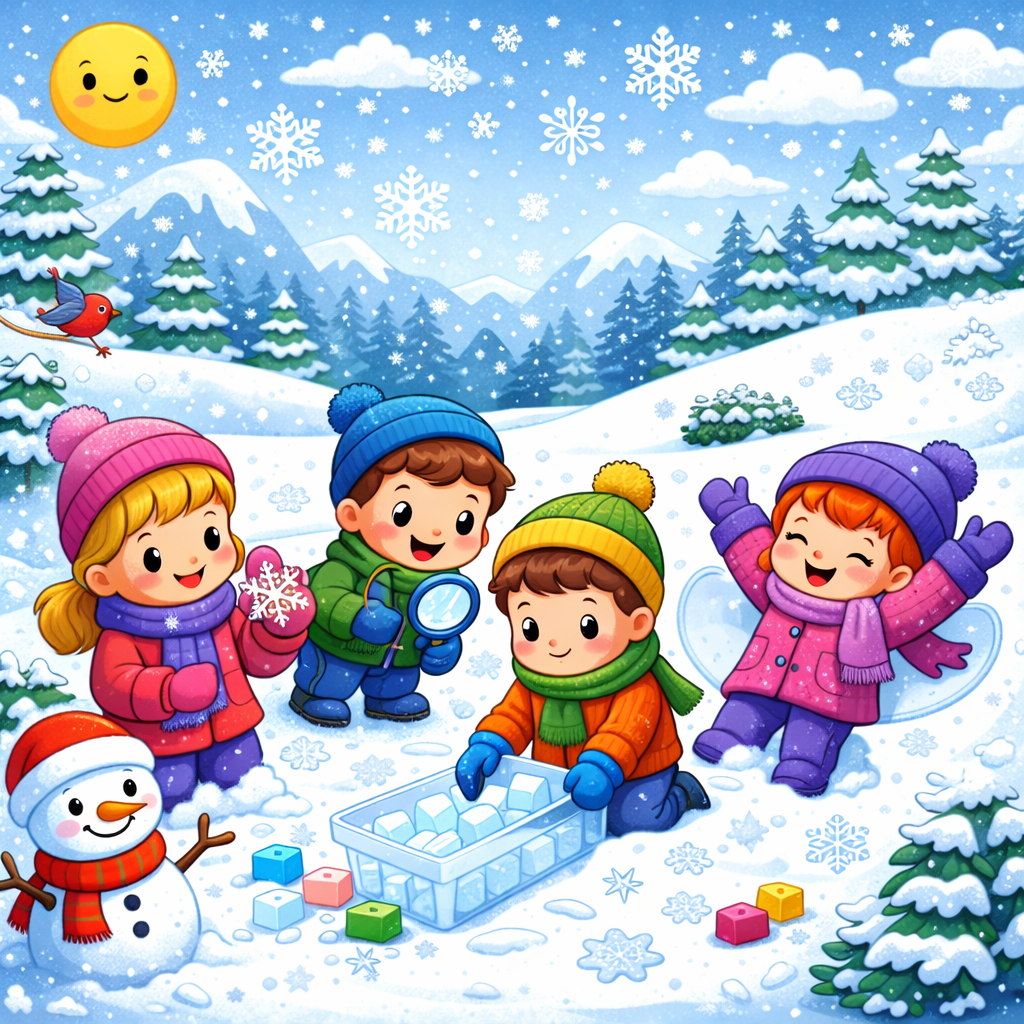
Winter is one of the most magical seasons for young children. Even a simple snowflake can feel like a tiny miracle, and a patch of ice can turn an ordinary walk into a full sensory adventure. At preschool age, children learn best through hands on exploration, curiosity, and play, which is why winter themes like snow, snowflakes, and ice make such meaningful learning opportunities. At Little Country Preschool, we use winter weather and seasonal discovery to help children build early science skills, creativity, independence, and emotional confidence in ways that feel joyful and natural. Why Snow and Ice Create Big Learning Moments for Little Kids Preschoolers are at the perfect age to develop early problem-solving skills and a love of learning. Snow and ice are exciting because they change the world in a way children can see, touch, and wonder about. Winter weather encourages children to ask important questions like: • Why does ice feel cold • Why does snow melt • What happens when water freezes • Why do snowflakes look different These questions are the beginning of scientific thinking, and they help children learn to observe, predict, and explore without fear of being wrong. Snowflakes Teach Children to Slow Down and Notice Details Snowflakes are one of nature’s best lessons in observation. They help children build attention skills and patience, which are essential for preschool learning. When children look closely at snowflakes, they practice: • Comparing shapes and patterns • Describing what they see • Learning new vocabulary • Expressing curiosity and wonder Even if it is not snowing outside, snowflake activities inside the classroom can bring the same learning benefits through art, sensory play, and story time. Ice Play Helps Develop Early Science Skills and Self Control Ice is fascinating to preschoolers because it behaves differently than water. Ice can slip, melt, crack, and change right before a child’s eyes. These experiences help children understand cause and effect and build early science foundations. Ice themed learning supports: • Understanding temperature changes • Exploring melting and refreezing • Practicing patience while waiting for changes to happen • Strengthening fine motor skills through simple experiments It also helps children learn gentle self-control, especially when they are excited and want to rush ahead. Winter Sensory Play Builds Confidence and Comfort Sensory play is one of the most powerful ways preschoolers learn, and winter themes offer beautiful sensory experiences. Snowy textures, icy surfaces, and winter colors help children engage their senses and build emotional regulation skills. Winter sensory activities support: • Calm focus and relaxation • Creativity and imaginative play • Communication and social connection • Comfort with new experiences Many children also gain confidence through winter routines, like putting on jackets, zipping coats, and preparing for outdoor play, all of which build independence. Outdoor Winter Play Helps Kids Grow Strong and Resilient Even during colder weather, outdoor play is valuable for preschoolers. Fresh air, movement, and exploration help children grow physically and emotionally. • Outdoor winter play can help children: • Build balance, coordination, and strength • Improve mood and energy through movement • Learn body awareness and safe boundaries • Practice teamwork and cooperation Winter also teaches flexibility, sometimes we play differently depending on the weather, and that helps children learn adaptability in a healthy way. Winter Learning Creates Warm Memories That Children Carry Forward Parents often remember winter as a season of both excitement and challenge. The cold weather, shorter days, and changes in routine can affect families. But for children, winter often becomes a season filled with wonder, joy, and discovery. Preschool winter themes help children build early learning skills while also creating something just as important, positive memories of learning, comfort, and connection. At Little Country Preschool, we focus on making winter feel safe, engaging, and meaningful, so children can enjoy the season while continuing to grow. Ready to Give Your Child a Preschool Experience Full of Wonder and Confidence? If you are looking for a preschool where learning feels warm, hands-on and joyful in every season, we would love to meet you. Contact Little Country Preschool today to schedule a tour and see how we help children grow through curiosity, creativity, and gentle confidence, even in the winter months.
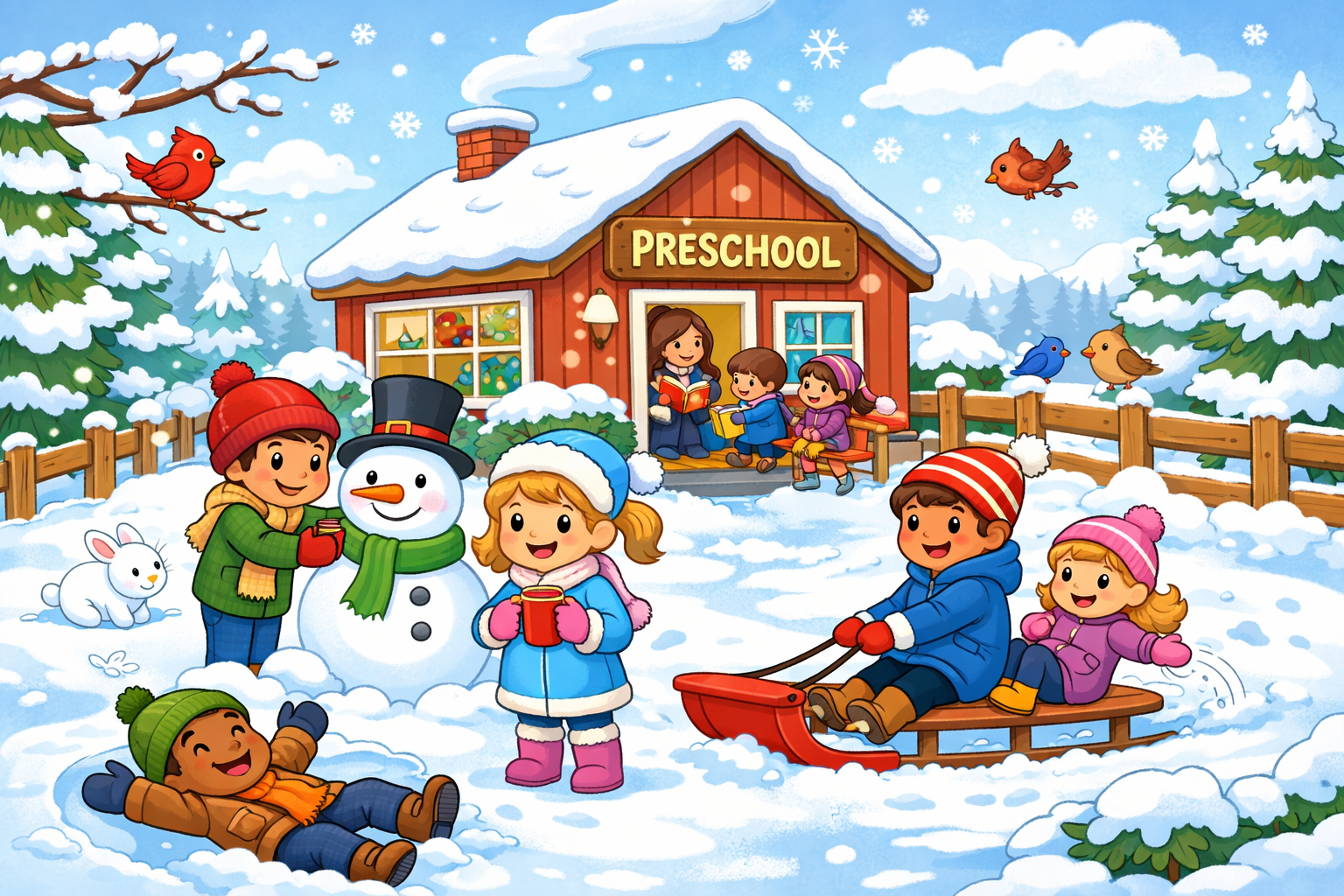
Winter often brings a mix of emotions for parents of preschool-aged children. Shorter days, colder weather, and changes in routine can feel challenging, especially for young children who thrive on consistency and movement. At Little Country Preschool, we see winter differently. We see it as a season of calm growth, emotional development, and meaningful learning experiences that support the whole child. Why Winter Is an Important Season for Early Childhood Development Winter naturally invites children to slow down, observe, and engage more deeply with their environment. While summer is full of outward exploration, winter supports inward growth. This balance is essential for preschoolers who are developing emotional awareness, problem solving skills, and early independence. During winter, children practice patience, cooperation, and adaptability. They learn how to transition between indoor and outdoor activities, how to dress for the weather, and how to navigate new routines with confidence. These experiences build resilience in ways that last well beyond the season. Cozy Learning Environments That Support Emotional Security One of the most important needs for preschoolers in winter is emotional comfort. A warm, predictable classroom environment helps children feel safe, seen, and supported. At Little Country Preschool, our classrooms are intentionally designed to feel calm and welcoming during the colder months. Soft lighting, hands on activities, and small group learning help children stay engaged without feeling overwhelmed. Winter is a wonderful time for storytelling, creative play, sensory exploration, and guided conversations that strengthen language skills and emotional expression. When children feel emotionally secure, they are more open to learning, even during seasonal changes. Outdoor Play Still Matters, Even in Winter Many parents wonder if winter limits outdoor learning. In reality, winter provides unique opportunities for physical development and curiosity. With appropriate clothing and supervision, outdoor play remains an important part of the preschool day. Children benefit from fresh air, movement, and exploration year round. Winter outdoor play supports balance, coordination, and immune health, while also teaching children to respect nature and adapt to different conditions. These experiences help children develop confidence in their bodies and their abilities. Winter Routines Help Children Build Independence Winter routines are especially valuable for preschoolers. Putting on jackets, managing layers, washing hands more frequently, and transitioning between activities all support independence and self-care skills. At Little Country Preschool, teachers gently guide children through these routines, encouraging them to try, practice, and succeed at their own pace. These everyday moments build confidence and a sense of capability that carries into kindergarten and beyond. Supporting Families Through the Winter Season We understand that winter can feel stressful for families. Illness concerns, busy schedules, and limited daylight can add pressure. Our goal is to partner with parents by providing a consistent, nurturing environment where children feel happy, engaged, and cared for. Clear communication, thoughtful planning, and a focus on emotional well being help families feel supported throughout the season. When parents know their child is thriving at school, winter feels a little lighter. Winter Is a Season of Quiet Growth and Lasting Foundations Preschool is not just about preparing for the next academic step, it is about nurturing confident, curious, and emotionally healthy children. Winter offers a beautiful opportunity to slow down, connect, and strengthen the foundations that matter most. At Little Country Preschool, we embrace winter as a season of warmth, learning, and growth, both inside and out. Ready to See How Winter Learning Feels at Little Country Preschool? We invite you to experience our nurturing environment firsthand. Schedule a tour of Little Country Preschool today and see how we support your child through every season of growth. Contact us to book your tour and learn more about our approach to early childhood education.

The New Year is a powerful moment, even for our youngest learners. While adults often think about resolutions and goals, preschool children experience the New Year as something just as meaningful, a time of fresh starts, curiosity, and new discoveries. At Little Country Preschool, we embrace the New Year as an opportunity to nurture confidence, kindness, and joyful learning. Rather than focusing on pressure or perfection, we guide children to explore growth in age-appropriate, playful ways that feel exciting and empowering. Why the New Year Is a Meaningful Milestone for Preschoolers Preschoolers thrive on rhythm and routine, but they also love moments that feel special and new. The New Year provides a natural transition point that helps children understand the passage of time while reinforcing emotional development. Through stories, conversations, and hands on activities, children begin to recognize ideas like change, progress, and possibility. These early experiences help lay the foundation for resilience, adaptability, and self-awareness. At Little Country Preschool, the New Year becomes a gentle invitation to explore questions like: What can I learn next? How can I be kind to others? What makes me feel proud of myself? New Year Learning Activities That Inspire Confidence and Creativity Our New Year curriculum focuses on developmentally appropriate activities that celebrate growth without pressure. Children participate in creative projects, collaborative play, and storytelling that highlight positive change. Activities may include: • Creating art that reflects things children enjoy and want to learn • Reading stories about trying new things and believing in oneself • Group discussions about emotions, friendships, and helping others • Play based goal setting that encourages curiosity rather than comparison These experiences help children feel capable and supported as they step into a new year of learning. Social and Emotional Growth Starts with Small Moments The New Year is also a beautiful time to reinforce social and emotional skills. Preschoolers are learning how to express feelings, work through challenges, and build friendships. By modeling patience, empathy, and encouragement, our teachers help children develop confidence in themselves and trust in their community. These skills are far more valuable than any resolution and will serve children well far beyond the classroom. How Parents Can Support New Year Growth at Home Parents play an important role in helping children feel secure and excited about new beginnings. Simple conversations and routines can make a big difference. Try asking open ended questions such as: What was something fun you learned today? What do you like about trying new things? How can we help each other this year? By celebrating effort and curiosity rather than outcomes, parents help children build a positive relationship with learning and change. Discover a Preschool That Celebrates Growth All Year Long At Little Country Preschool, the New Year is not about rushing children forward. It is about honoring who they are while gently supporting who they are becoming. Our nurturing environment, experienced teachers, and play based curriculum help children feel confident, safe, and excited to learn, not just in January, but every day of the year. Schedule a Tour and Start the New Year with Confidence If you are looking for a preschool that values emotional growth, creativity, and joyful learning, we invite you to visit Little Country Preschool. Schedule a tour today and discover how we support meaningful beginnings, confident learners, and a love of learning that lasts far beyond the New Year.

Christmas is celebrated in many ways across the world, but the heart of the season remains the same, gatherings, sharing kindness, and creating a sense of home. At Little Country Preschool, our Global Christmas Traditions theme helps children explore how families around the world celebrate this special time while learning that love and connection look familiar everywhere. For preschool aged children, discovering global traditions builds empathy, curiosity, and confidence. It teaches them that while customs may look different, the feelings behind them are shared by all. How Learning Global Christmas Traditions Supports Early Childhood Development Building cultural awareness early creates kinder humans Later. Preschoolers are naturally curious. When children learn that Christmas is celebrated with lanterns in one country, shoes instead of stockings in another, or special foods shared by generations, they begin to understand the world beyond themselves. Through stories, hands on activities, and imaginative play, children learn: • Respect for different cultures and traditions • That families celebrate in many meaningful ways • Confidence in asking questions and expressing curiosity • Emotional intelligence and empathy for others These lessons form the foundation of social and emotional growth that lasts a lifetime. Christmas Traditions Around the World, Shared Through Play and Story Here at Little Country Preschool, we focus on global learning that is age-appropriate, joyful, and memorable. We introduce global Christmas traditions in ways preschoolers can understand and enjoy. Children may explore: • Holiday stories from different countries • Traditional decorations and colors from around the world • Music, movement, and festive art projects • Pretend play that allows children to experience celebrations through imagination Learning happens best when children feel safe, excited, and engaged. By bringing the world into our classroom, we make learning meaningful and fun. Parents Love a Global Approach to Holiday Learning Because it Helps Children Feel Proud of Who They Are While Respecting Others Parents often tell us they appreciate that our holiday curriculum focuses on inclusion, curiosity, and kindness. Children are encouraged to share their own family traditions while learning about others, creating a sense of pride and belonging. This approach helps children: • Feel seen and valued • Understand that differences are something to celebrate • Build confidence in social settings • Develop a love of learning that extends beyond the classroom • A Classroom Where Every Child Feels at Home During the Holidays • Creating Warmth, Wonder, and Connection All Season Long The holidays can feel overwhelming for young children. At Little Country Preschool, we create a calm, joyful environment where children feel secure and supported. Our Global Christmas Traditions theme focuses on connection rather than overstimulation, helping children experience the season with wonder and comfort. Schedule a Tour and Experience the Magic of Learning Together Discover How Little Country Preschool Brings the World into the Classroom If you are looking for a preschool that values kindness, curiosity, and meaningful learning, we invite you to tour Little Country Preschool. Come see how our Global Christmas Traditions theme helps children grow into thoughtful, confident learners who feel at home in the world. Schedule a tour today and discover a place where every child belongs.

The holiday season offers more than decorations and excitement. For preschool aged children, it is a meaningful opportunity to learn about the wider world in ways that feel joyful, gentle, and age appropriate. One of the most valuable lessons young children can experience during this time is learning how families around the world celebrate Christmas and winter traditions. At Little Country Preschool, we believe early childhood education should nurture curiosity, empathy, and an understanding that differences are something to be celebrated. Why Global Christmas Traditions Matter in Early Childhood Education Preschool aged children are naturally curious. They notice patterns, ask questions, and are beginning to understand that other people may live, think, and celebrate differently than they do. Introducing global Christmas traditions helps children build early cultural awareness without overwhelming them. Learning that some families celebrate with candles, others with music and parades, and others with warm beach gatherings teaches an important truth. Traditions may look different, but values like love, family, generosity, and kindness are shared across cultures. These lessons support early social emotional development and help children begin to see the world as a connected and welcoming place. Building Empathy Through Stories, Art, and Play Preschoolers learn best through stories, hands on activities, and imaginative play. Exploring global holiday traditions allows teachers to introduce geography, customs, and language in ways that feel natural and engaging. Children may hear stories about how Christmas is celebrated in Germany, Mexico, Italy, or Australia. They may create simple art inspired by different traditions or listen to music from around the world. These experiences help children practice perspective taking and empathy, skills that are essential for healthy social development. When children learn that not everyone celebrates the same way, they also learn respect. This understanding builds a strong foundation for inclusivity and kindness as they grow. Supporting Language, Cognitive, and Social Development Learning about global traditions also supports important early learning skills. Listening to stories builds language development and comprehension. Talking about different countries encourages vocabulary growth and early geography awareness. Group discussions help children practice communication and cooperation. These experiences strengthen cognitive skills while keeping learning joyful and developmentally appropriate. Children are not memorizing facts, they are making connections, asking questions, and engaging with new ideas. Helping Families Continue Learning at Home Parents play an important role in reinforcing these lessons. Reading books about holiday traditions, cooking simple international foods together, or talking about how different families celebrate can extend learning beyond the classroom. These conversations help children feel confident asking questions and expressing curiosity. They also create meaningful family moments during the holiday season that focus on connection rather than comparison. A Preschool Environment That Values Curiosity and Inclusion At Little Country Preschool, we intentionally create learning experiences that support the whole child. Exploring global Christmas traditions is one way we help children develop empathy, cultural awareness, and a sense of belonging in a diverse world. Our curriculum is designed to be nurturing, educational, and respectful of all families. We focus on helping children grow into kind, confident learners who are curious about the world around them. Schedule a Tour of Little Country Preschool Choosing the right preschool is an important decision. We invite you to see how Little Country Preschool creates a warm, engaging learning environment that supports your child’s growth, curiosity, and emotional development. Contact us today to schedule a tour and learn more about our early childhood education program. We would love to welcome your family and show you how we help children learn through connection, creativity, and care.
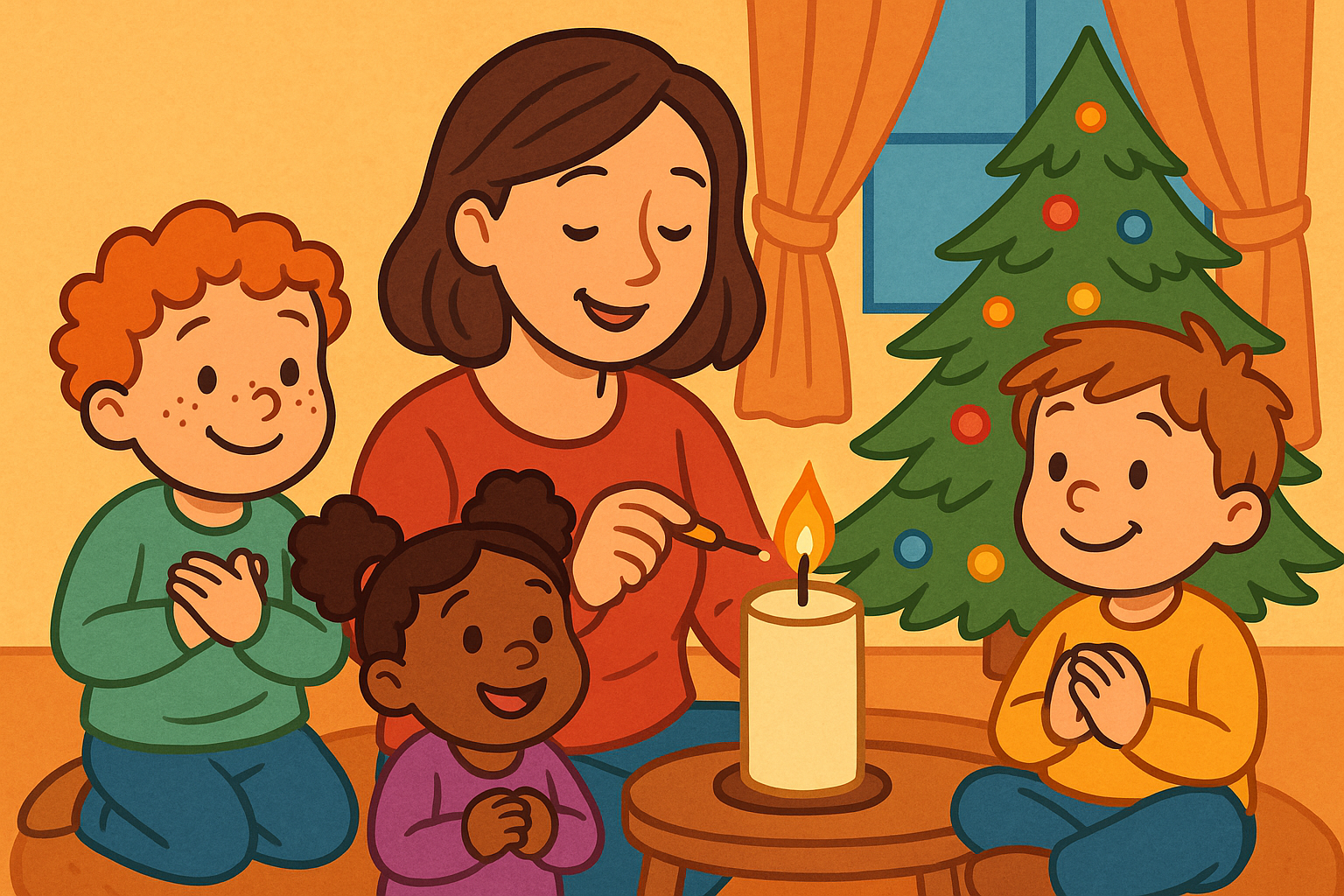
Winter celebrations around the world remind us of something beautiful. People everywhere find ways to create warmth when the days are cold and dark. For preschool aged children, this season is an invitation to slow down, gather close, and learn that traditions are made from love, not perfection. Whether your family celebrates a specific holiday or simply enjoys the winter season, you can use this time to build joyful routines that help your child feel grounded, connected, and curious about the wider world. Below are gentle, preschool friendly traditions inspired by winter celebrations across many cultures, along with easy ways to bring their spirit into your home. The Heart of Winter Celebrations: Light, Togetherness, and Hope Across cultures, winter holidays often share a few comforting themes: Light in darkness, bright decorations, new beginnings, welcoming a fresh season, and welcoming a new year with hope. Preschoolers understand these themes through experience, not explanation. When they help you light a candle, stir a warm soup, or wrap a small gift, they are learning what celebration feels like. A Loving Family Light Ritual Many winter traditions focus on light, from Hanukkah candles to St. Lucia processions, to Diwali in some regions, to solstice celebrations worldwide. You can create your own light ritual that fits your family. Try this simple evening tradition: • Turn off the main lights for a moment. • Light a safe candle substitute together (a battery candle or small lamp works perfectly). • Ask one gentle question, “What made you feel cozy or happy today?” • Share a short answer, then turn the lights back on together. This takes two minutes, and it builds a sense of calm, reflection, and safety that preschoolers love. Winter Storytelling from Around the World During winter celebrations, families everywhere tell stories, folktales, family memories, and simple bedtime tales with hot cocoa nearby. Stories help children understand that the world is full of different ways to live and love. Preschool-friendly ways to explore global winter stories: • Check out picture books about Lunar New Year, Hanukkah, Christmas, Kwanzaa, and winter solstice traditions. • After reading, ask a soft question like, “What did that family do that felt special?” Let your child draw their favorite part. Warm Food Traditions Food is at the center of winter celebrations everywhere. It is how families share care. The specific dishes change by culture, but the feeling is universal Cooking traditions for preschoolers: • Stirring soup, mixing batter, sprinkling toppings. • Rolling simple dough balls, like bread rolls or cookie dough. • Creating a “family feast plate” with small tastes of different foods. As your child helps, you can say, “People all over the world make special foods in winter to show love.” Giving and Gratitude, the True Season of Kindness Many winter holidays include giving, gifts, charity, or acts of service. Preschoolers may not understand big concepts like generosity yet, but they understand small, concrete acts. Preschool sized giving ideas: • Let them choose a toy to donate. • Help them make a card for a neighbor. • Help them bake something for a friend. • Help you put birdseed outside for winter animals. These tiny actions teach the heart of celebration better than any explanation. Create Your Own Family Winter Tradition Some of the most cherished traditions are not inherited, they are invented. Preschoolers adore repetition, so even a small ritual becomes magic when it happens every year. Ideas to try: • A special winter walk with hot drinks afterward. • Pajama movie night with a cozy blanket fort. • A “kindness countdown” where you do one small kind act each day. • Decorating a window with paper snowflakes while listening to calming music. The goal is not a perfect holiday. The goal is a child who feels safe and celebrated. Tour Little Country Preschool Today! At Little Country Preschool, we celebrate winter with stories, music, crafts, and classroom traditions that help children feel connected to their friends, their families, and the wider world. If you are looking for a preschool where your child’s curiosity is nurtured and their heart is cared for, we would love to meet you. Come visit our cozy classrooms, meet our teachers, and see how we help little learners grow through play, connection, and joyful seasonal discovery. Reach out now to book your tour.

Winter is a season of lights, stories, and togetherness. All around the world, families mark the darker, colder months with celebrations that help children feel safe, hopeful, and connected. For preschoolers, these traditions are not about memorizing facts. They are about wonder. They are about seeing that people everywhere find ways to gather, to share food, to sing, to give, and to welcome new beginnings. Exploring winter celebrations from different cultures is also a gentle way to teach kindness and curiosity. When children learn that other families celebrate in beautifully different ways, they begin to understand that the world is big, and that they belong in it. Below are a few winter celebrations from around the globe, plus simple, preschool friendly ways to experience their spirit at home. The Festival of Lights, Hanukkah Hanukkah is a Jewish winter holiday often called the Festival of Lights. Families light a menorah over eight nights, play games like dreidel, and enjoy foods such as latkes, which are potato pancakes, and sufganiyot, jelly filled doughnuts. Preschool way to share it: Invite your child to help you “add light” each evening. You can turn on a small lamp together, place a paper candle on a window, or even make a simple menorah craft with playdough and battery tea lights. The focus is on the feeling of warm light growing night after night. Kwanzaa, A Celebration of Family and Heritage Kwanzaa is celebrated from December 26 through January 1 as a way to honor African heritage, family, and community. Each day highlights a guiding principle such as unity, purpose, and creativity, and families often light a kinara, share stories, and enjoy special meals together. Preschool way to share it: Choose one principle to explore with your child, like unity or kindness. Ask, “What does unity look like in our family,” then make a small collage of family photos or draw pictures of times you helped each other. Kids learn values best through simple, loving examples. Lunar New Year, Welcoming Luck and New Beginnings Lunar New Year is celebrated in many Asian cultures, including Chinese, Vietnamese, and Korean communities. Families clean their homes to sweep out bad luck, decorate with red for good fortune, share meals, and enjoy parades with drums and dancing. Preschool way to share it: Make a “fresh start” ritual together. Let your child help tidy a small space, then decorate it with red paper chains or lanterns. You can read a picture book about Lunar New Year and talk about how everyone gets to begin again, with hope. St. Lucia Day, Light in the Darkest Season In parts of Scandinavia, St. Lucia Day celebrates bringing light into winter. Children often wear white, sing songs, and carry candles to symbolize brightness returning. Preschool way to share it: Have a little morning “light parade” at home. Your child can wear something white and carry a safe candle substitute like a flashlight. Walk through the house quietly, then turn on lights together. It is sweet, simple, and memorable. Winter Solstice Traditions, Honoring the Return of the Sun Many cultures celebrate the winter solstice, the longest night of the year, as a turning point toward longer days. Traditions include Yule in Northern Europe, Dongzhi in China, and Yalda in Iran, all centered on family, food, and the return of light. Preschool way to share it: Pick one evening to celebrate your own “return of the light.” Eat a cozy dinner by candlelight, talk about how the days will slowly grow brighter, then do a tiny gratitude circle, even just, “What made you feel warm today.” A Heartwarming Next Step, Bring Your Child’s Curiosity to Life At Little Country Preschool, we love helping children explore the world through play, stories, music, art, and seasonal traditions that celebrate kindness and belonging. If you want a school where your child’s wonder is protected and encouraged, we would love to meet you. Schedule a Tour of The Little Country Preschool Today! Schedule a tour and step into our cozy classrooms, meet our teachers, and see how we help little hearts grow big. Reach out today to book your visit.
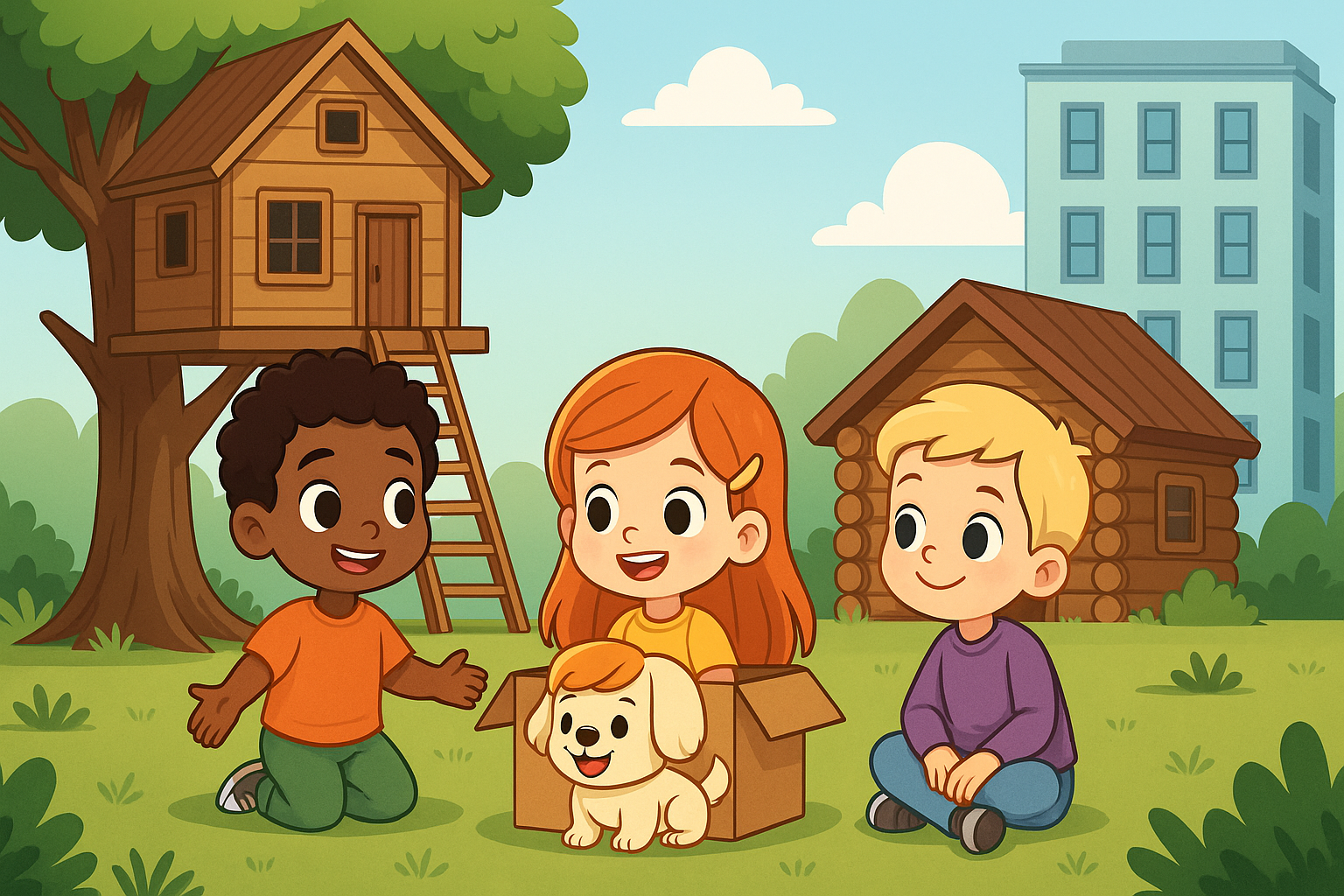
At Little Country Preschool, each week is a new adventure in discovery. This week’s theme, “Homes Around the World,” gives children a chance to explore how families live across our planet and, in the process, helps them build a foundation for empathy, cultural awareness, and belonging. Discovering Diversity Through Play and Imagination When preschoolers learn about homes around the world, they begin to see that the word “home” can mean many things: a houseboat floating on a river, a cozy igloo, a small apartment in the city, or a colorful adobe dwelling. Through stories, crafts, and building projects, children are introduced to the beauty of diversity in a way they can see, touch, and understand. Pretend play deepens that understanding. When children use blocks to build new kinds of houses or imagine living somewhere far away, they are practicing flexibility, creativity, and cooperation. As they talk about their own homes and families, they begin to notice that every family, no matter where they live, shares the same hopes for comfort, safety, and love. Helping Children See the Connections That Unite Us Preschool is a time when children start noticing differences in language, clothing, homes, and traditions. Our “Homes Around the World” activities help guide these observations toward understanding instead of judgment. By comparing materials, colors, and customs, children learn to celebrate what makes people unique while recognizing what connects us all. When a child says, “They have windows like mine,” or “Their home has a roof too,” they are making the first links of global empathy. Parents can extend this learning at home with simple conversations. Reading picture books about families in other cultures, preparing a meal inspired by another country, or pointing out different architectural styles in your own community all reinforce the idea that diversity is something to value. Early Geography Meets Emotional Growth This theme naturally weaves academic learning with social and emotional development. As children explore maps, identify continents, and talk about climates, they are also strengthening vocabulary, observation, and curiosity. At the same time, they are building emotional intelligence, the ability to understand how others live and feel. This awareness helps them grow into respectful, compassionate individuals who can appreciate both their own home and the many homes that make up our shared world. A Place Where Every Child Feels at Home At Little Country Preschool, we believe that belonging begins with understanding. Through themes like “Homes Around the World,” our classrooms become places where children can learn about the world while feeling loved and valued exactly as they are. Each lesson opens a door to curiosity and kindness, essential qualities for every growing heart and mind. Schedule a Tour of Little Country Preschool Today If you’re searching for a preschool that nurtures curiosity, empathy, and global awareness, we invite you to experience Little Country Preschool for yourself. Schedule your tour today and see how we help children feel at home in our classrooms, our community, and the world beyond.
